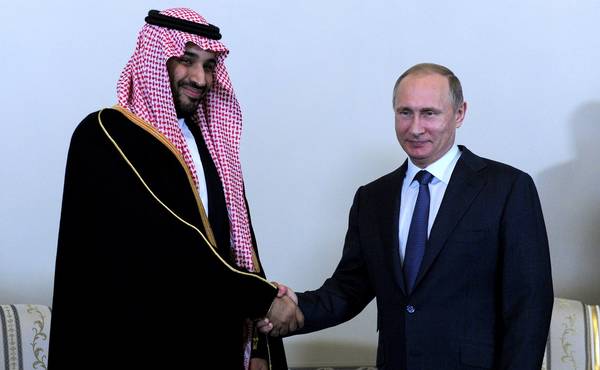
Behind the closed doors of the royal palace in Riyadh, there are secret whispers of plots, scheming and scandal. Members of the House of Saud are known to make and remake the rules of dynastic succession to suit their ever-changing interests. Intelligence agencies and the media often refer to it as Saudi Arabia’s “game of thrones”, a political world that more closely resembles a fictional world of court intrigue than ordered government.
But rarely does court intrigue lead to soft coups. No other term best captures what befell Mohammad bin Nayef, until recently first in line to succeed the elderly King Salman as Saudi Arabia’s next ruler.
Bin Nayef had made a name for himself as the country’s top counter-terrorism chief, the “prince of darkness” who had built an internationally well-regarded security apparatus to crack down on radical Saudi Islamists. But even his ties to security services worldwide couldn’t save him from being knifed in the back – and he proved no match for the king’s favoured son, Mohammad bin Salman. After he was displaced, he was unceremoniously placed under house arrest while his replacement began making his mark.
Coming on the coattails of a devastating war in Yemen, bin Salman’s meteoric rise to power is raising eyebrows the world over. In his two-year tenure as minister of defence, the young prince packaged himself as energetic and charismatic, while championing an authoritarian and populist brand of politics that now permeates every religious establishment and consumer outlet in the country. Even fast-food chains in Riyadh are obliged to pledge allegiance to the new crown prince.
A country not yet transformed
Mohammad bin Salman represents a new generation of Saudi princes with a zeal for grandiose modernisation. As deputy crown prince, he made international waves with the Vision 2030, a bold but probably unrealistic strategy to boost the Kingdom’s non-oil economy concocted by the consulting firm McKinsey.
The plans aim to generate $100bn in non-oil revenue by 2020 and create 6m jobs in non-oil sectors by 2030. This would represent a wholesale restructuring of the economy accompanied by massive privatisations, a restructuring of the Saudi welfare state, and, importantly, selling 5% of the state oil company Aramco to international bidders to help fund the notoriously expensive Saudi war machine. Critics question whether these epochal plans make any rational sense in a country that couldn’t even manage to cut down on expensive perks for its lavishly funded civil service.
Worse yet, Saudi Arabia’s erratic economic policies are coupled with an even more dangerous militarism. Gravely alarmed by the incremental US-Iranian rapprochement that began under Barack Obama, bin Salman and his father have decided to redraw the contours of Saudi foreign policy. They are the prime architects of Saudi Arabia’s uncompromising stance towards the Rouhani government in Iran, lately vowing to bring the two country’s long-running proxy wars to Iranian territory.
As foreign policy has been moulded to suit the new hawkish tone, the royal administration has witnessed a centralisation of power in the hands of the Salman family, undoing the consensual and deliberative model that had characterised the country’s decision-making apparatus for decades. Gone are the days of cautious and careful decisions by elderly statesmen which was the hallmark of Saudi Arabia’s step-by-step approach to policy for decades.
Raising the stakes
Mohammed bin Salman’s war in Yemen, launched immediately after he was appointed deputy crown prince and minister of defence in 2015, and now his second “war” on Qatar, are bids to project strength domestically and outdo competitors at home.
While the Yemen War is fought with deadly weapons and air strikes, Qatar has been the target of a fierce media attack. Dozens of Saudi-employed public relations companies are working to tarnish Qatar’s credentials in the Arab world, branding the country an Iranian stooge and supporter of terrorism – the latter a surprising charge given Saudi Arabia’s own reputation in that department.
The attempt to bring Qatar to heel is the first major test of the Riyadh leadership’s relentless new interventionism. The risk is that the push doesn’t garner support beyond a small coterie of less powerful countries who rely on Saudi oil. Qatar has so far vowed not to relinquish its sovereignty or agree to the “outsourcing” of its foreign policy.
The whole incident has drawn an unflattering contrast between the Saudis’ short-termism and Qatar’s more orderly long-term thinking. Whereas the Saudis are motivated by the immediate gain of destroying Qatar’s independence even at risk to their long-term international reputation, the Qataris’ long-term strategic partnerships with Tehran, Ankara and European capitals are now paying off when they’re needed most.
![]() With bin Salman now installed, this all augurs ill for Saudi Arabia’s future. The new politics of interventionism to which the young prince apparently subscribes does not match Saudi Arabia’s capabilities as a regional power – and Riyadh’s suddenly hawkish tone is less than palatable to even some of its close friends in the Gulf. And more worryingly still, many of the usual constraints don’t apply: with a vacillating, confused Washington unwilling or unable to rein in its dangerous partner, further turmoil is very much on the horizon.
With bin Salman now installed, this all augurs ill for Saudi Arabia’s future. The new politics of interventionism to which the young prince apparently subscribes does not match Saudi Arabia’s capabilities as a regional power – and Riyadh’s suddenly hawkish tone is less than palatable to even some of its close friends in the Gulf. And more worryingly still, many of the usual constraints don’t apply: with a vacillating, confused Washington unwilling or unable to rein in its dangerous partner, further turmoil is very much on the horizon.
Babak Mohammadzadeh, PhD Candidate in Politics and International Studies, University of Cambridge
This article was originally published on The Conversation. Read the original article.

